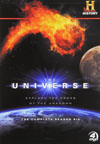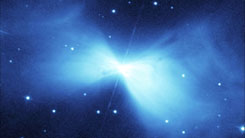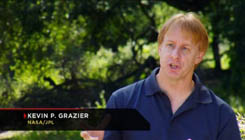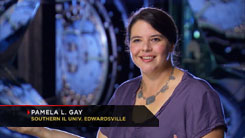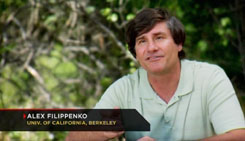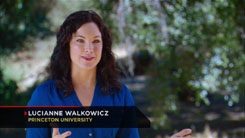This is a fairly good and entertaining episode of the sixth season,
although perhaps it spent a little too much time with re-run topics
instead of the specific depths that can make this show great.
Segment 1 begins by reminding us how much the early universe had to cool down
just for matter to form. Much of the rest of the segment is taken up
by touring the coldest places in the solar system, from Antarctica,
to the eternally dark polar craters of our moon and Mercury,
to the many worlds orbiting our outer gas giants. Europa and Enceladus
get their usual expanded coverage, which is solidly good, but nothing
that hasn't been covered in previous episodes. Kevin Grazier attempts
to demonstrate how scientists identify geological activity on a world
by using a Zamboni machine on a hockey rink, yet he seems to make the surface
rougher instead of smoother, thus contradicting what he is saying. Oops.
Perhaps he should have let a more experienced operator get onto the Zamboni.
Split between segments 1 and 2 is a bit about the launch of the New Horizon
spacecraft heading for Pluto. Much is made of the fact that NASA would like to
send it on to a second target, yet is asking for the public's help to sort through
hundreds of images to first discover and select such an object from all the numerous
Kuiper Belt possibilities.
Much more fascinating is the thoroughly unique section devoted to the
recently discovered dwarf planet Sedna, with Alex Filippenko going into detail
concerning its orbit and probable theories of its origins. Many different kinds
of ice are then discussed, as is the concept of ice going directly into a gas
as it heats up.
Episode 53 - Liquid Universe makes a great companion
documentary for investigating this phenomenon.
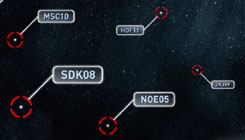
The third segment labeled "Icy Exoplanets" really only talks about one specific world,
called "OGLE-2005-BLG-390L b". At about five times the size of Earth, it was
one of the smallest of the 700 extrasolar planets discovered as of 2012,
and theorized to be very cold. Much of the rest of the segment discusses
rogue planets outside of any solar system, suggesting that we've found enough of
them to believe they're twice as common in our galaxy as stars.
(Are they including
brown dwarfs in their count?). Earth is
also discussed, both in terms of the ice ages we've already experienced,
and which parts of our ecosystem might possibly survive should our home planet
"go rogue".
Segment four continues to tour the coldest places in the universe, which include
a Y-class brown dwarf at only 80 degrees Fahrenheit
(for comparison our sun is around 10 000 degrees Fahrenheit),
the shadow cloud Barnard 68,
the bow-tie shaped Boomerang Nebula (5000 LY away)
which, at 1 degree Kelvin or -458 degrees Fahrenheit,
is thought to be the coldest known natural place in the universe.
But in laboratories here on Earth, we have artificially topped that,
creating temperatures of something like one half of a nano-Kelvin,
at which point atoms exhibit "entrainment" behaviour turning into
some very unusual forms of matter.
|
Participants include:
|
And the "Ask the Universe" question for this episode is:
"What's colder, a comet or an asteroid?"
-Travis S., Cedar Rapids, IA
Chapter List:
- Coldest Corners
- New Horizons Mission
- Icy Exoplanets
- More Frigid Places
- Ultimate Deep Freeze
|
|
